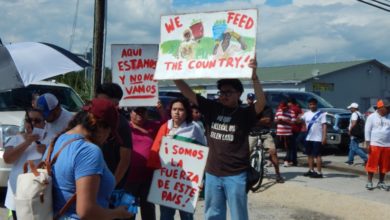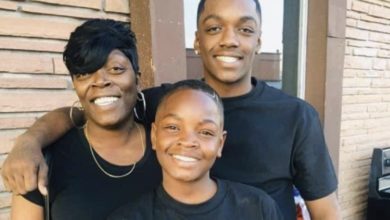When civil rights activists charge cops or courts with racial profiling, the answer is always the same: racial profiling is carried out by “a few bad apples” and is not official policy.
But on June 13, a federal court judge took a step to make sure that racial profiling becomes the law of the land.
 U.S. detentions and deportations of Muslims and Arabs have been subjects of worldwide outrage and protest. Demonstration in London, April 30, 2005. Photo: AlessandroAbbonizio/AFP/GettyImg |
Judge John Gleeson of the U.S. District Court for the Eastern District Court of New York in Brooklyn ruled, “The executive [branch of government] is free to single out ‘nationals of a particular country’ and focus enforcement efforts on them.” He issued the ruling in the case of a lawsuit involving hundreds of New York City Muslims who were rounded up and arrested following the Sept. 11, 2001 attack on the World Trade Center.
The judge ruled that non-citizens may be rounded up and arrested—just because of their country of origin. The ruling asserts that the president or the Justice Department have the right to detain non-citizens for any reason.
“This decision is a green light to racial profiling and prolonged detention of non-citizens at the whim of the president,” said Rachel Meerpol, a lawyer from the Center for Constitutional Rights who is representing the detainees.
After the Sept. 11 attack, U.S. Attorney General John Ashcroft issued an order to use immigration laws to round up any non-citizens who were suspected of ties to terrorism. Police and immigration agents swept through South Asian and Arab neighborhoods, rounding up Muslims and Arabs around the city. An Oct. 17, 2001 Financial Times article estimated 600 detainees in the month after Sept. 11.
It was part of the anti-Arab and anti-Muslim hysteria whipped up after the attacks to justify the U.S. war drive in the Middle East and Afghanistan. Muslims around the country were subjected to media slanders and demonization. Harassment and fear of violence plagued Muslim communities.
The immigration raids for “terrorism” only heightened both the hysteria against Muslims and the fear of speaking out in Arab and Muslim communities.
Brutal prison conditions
Once arrested, none of the detainees were charged with terrorism—or even conspiracy to commit terrorist acts. Many were deported outright. Others were subjected to brutality and torture while imprisoned.
An April 3, 2006, article in the New York Times described the conditions of detainees at the Passaic County Jail in New Jersey, where at that time 400 of the 762 people detained nationwide were being held.
Two deported immigrants described conditions inside the jail. “Two or three times a week,” they said, “often around 3 a.m. when the detainees were fast asleep in dormitory cells holding about 50 men, the electronic doors would open and 10 to 20 officers would rush in with four to six unmuzzled, barking dogs on leashes. The dogs, mostly German shepherds, would strain to within inches of the detainees’ faces, they said.”
“The guards who were holding us always used to laugh,” recounted Akhil Sachdeva, a Canadian who was born in India. Sachdeva was deported after being cleared of any connections to terrorism. He also detailed bloody beatings by guards when prisoners who didn’t speak English couldn’t follow orders.
Detainees at Brooklyn’s Metropolitan Detention Center faced even worse treatment. They were routinely held in solitary confinement. Videotapes showed shackled detainees being beaten by guards.
Judge Gleeson’s decision did allow the lawsuit to proceed on grounds that the detainees’ confinement was abusive and unconstitutional.
CCR lawyers vowed to challenge the ruling that non-citizens could be arrested on the basis of their nationality.






